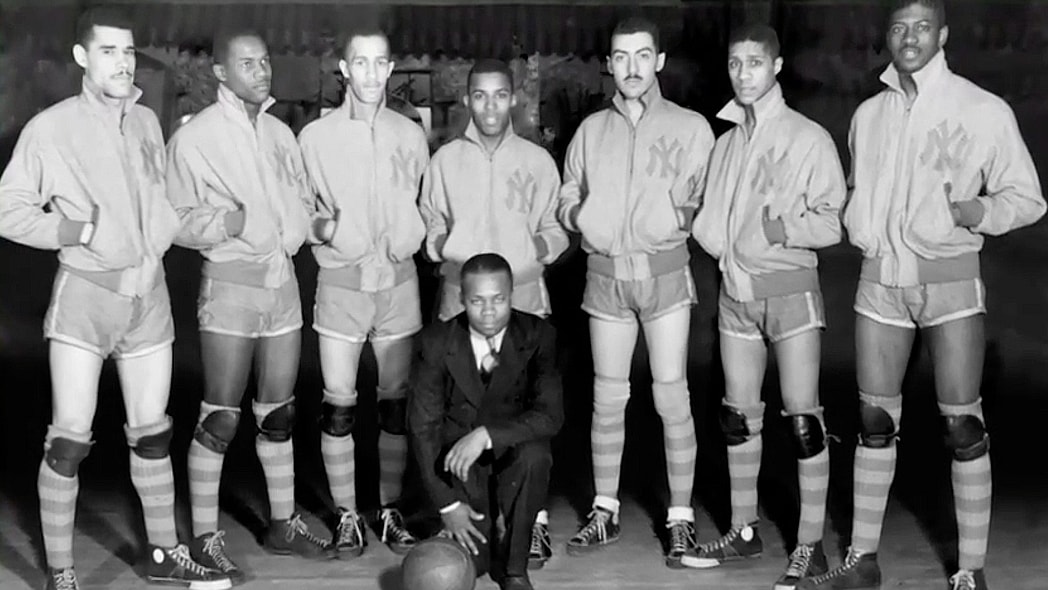History indeed can repeat itself. Lord knows we’re seeing that again in Black America’s back-and-forth battle against racism.
But for all the pain and strife we’ve endured, we’ve also mastered finding joy amidst sorrow while planting hope for tomorrow. Pick any field you like—agriculture, business, science, communications, etc.—and you’ll find examples of Black ingenuity dating to our arrival on these shores.
Fifty years ago on Feb. 5, 1972, the Basketball Hall of Fame recognized as much when it welcomed Robert “Bob” Douglas, its first Black honoree. Douglas was so cold as a coach and entrepreneur, the team he founded beat him there by nine years, enshrined in 1963.
The New York Renaissance—aka the “Harlem Rens” and “New York Rens”—were as formidable on the court as they were in the culture. They provide a case study for what was possible under segregation (and what’s been lost since integration), maneuvering through an openly hostile era with excellence, paving the way for today’s predominantly Black NBA.
Ascending from the ranks of Black barnstorming teams that were wildly popular as the Harlem Renaissance picked up steam, the Rens were pioneers in every sense. They were formed in 1923 when Douglas reached a deal with the newly opened Renaissance Ballroom and Casino in Harlem. Douglas agreed to name his team after the ballroom, in exchange for playing home games at the facility. In return, the ballroom owner received promotion all over, which helped pack the premises for steamy post-game dances.
One year earlier, a couple of white sports promoters formed a Black team and reached a similar deal with another Harlem casino. They offered their players guaranteed, full-year contracts, making the Commonwealth Five the first fully professional Black basketball squad. When Douglas followed suit with the Rens, they became the first Black-owned pro hoops team. (The NBA and antecedent leagues didn’t have a Black-owned franchise until BET founder Robert Johnson purchased the Charlotte Bobcats in 2004).

The Rens proceeded to dominate basketball for the next quarter-century—defeating all comers, regardless of skin color—until the NBA was integrated in 1950. From the Black Fives Foundation: “During that period, the Rens routinely beat white national champion basketball teams like the Original Celtics, the Philadelphia SPHAS, the Oshkosh All Stars, and the Indianapolis Kautskys. The irony is that the leagues in which these teams played did not allow African American players or teams to join.”
If you can’t join them, beat them. That seemed to be the motto.
The Rens slept on the bus because their kind wasn’t welcome in hotels? Got it. They ate cold food on the road or relied on kind white folks to purchase hot meals? Cool. Their interracial games sometimes featured crowds that weren’t at all opposed to violence? No problem.
And they didn’t just win, win, win, win, win; they stayed there, compiling over 2,000 victories—including 88 straight during the 1932-33 season. And they did it with style.
The late, legendary UCLA coach John Wooden, who played against the Rens in the ’30s, once said “to this day, I have never seen a team play better team basketball. “They had great athletes, but they weren’t as impressive as their team play. The way they handled and passed the ball was just amazing.”
The Hall of Fame put it this way: “The Renaissance moved the ball around with such wizardry and deception that the opposition was often rendered helpless. … the fancy-passing Rens barnstormed throughout the country making easy work of lesser teams. The Rens were unsurpassed in passing ability and the fast break left opponents begging for mercy.”
In addition to winning multiple Colored Basketball World Championships, the Rens won the inaugural World Championship of Professional Basketball in 1939, defeating the all-white National Basketball League’s all-white champions in a historic matchup. The NBL added the Rens when it expanded in 1948, but the affiliation lasted just one season and the team disbanded afterward. In 1950, the recently formed NBA made Chuck Cooper its first Black draftee. (The NBL, a direct precursor that’s been snubbed in NBA history, added its first Black players in 1942).
Everyone has heard of the Harlem Globetrotters, whose influence on the sport is clear. No shade, but they were perpetrators in a sense. Founded in Chicago in 1926, they used Harlem as a synonym for “colored.” Conversely, the Harlem Rens were real-deal NYC, like the burgeoning wave of Black literature, art, and music that flowed from uptown in the ’20s and ’30s.
That history lives on today.
It’s captured in Kareem Abdul Jabbar’s 2011 documentary, On the Shoulders of Giants, as well as the New York Renaissance Basketball Association, and the Earl Monroe New Renaissance Basketball School, whose motto is “A ball and a book change the world.”
Jabbar said he wants people to know about the Rens’ contributions to basketball “because it’s important that we honor those pioneers who made this billion-dollar industry possible. It’s also important that we recognize the people of color who did so much but that history has deliberately ignored.”
The Rens’ success is the type of history we can’t ignore and don’t mind repeating.

An award-winning columnist and a principal of BlackDoor Ventures, Inc., Deron Snyder is a veteran journalist, stratcomm professional, author, and adjunct professor. A native of Brooklyn and an Alpha from H.U.-You Know, he resides in metropolitan DC with his wife, Vanessa, mother of their daughters, Sierra and Sequoia. To learn more, please visit blackdoorventures.com/deron.
TheGrio is now on your TV via Apple TV, Amazon Fire, Roku, and Android TV. Please download theGrio mobile apps today!


